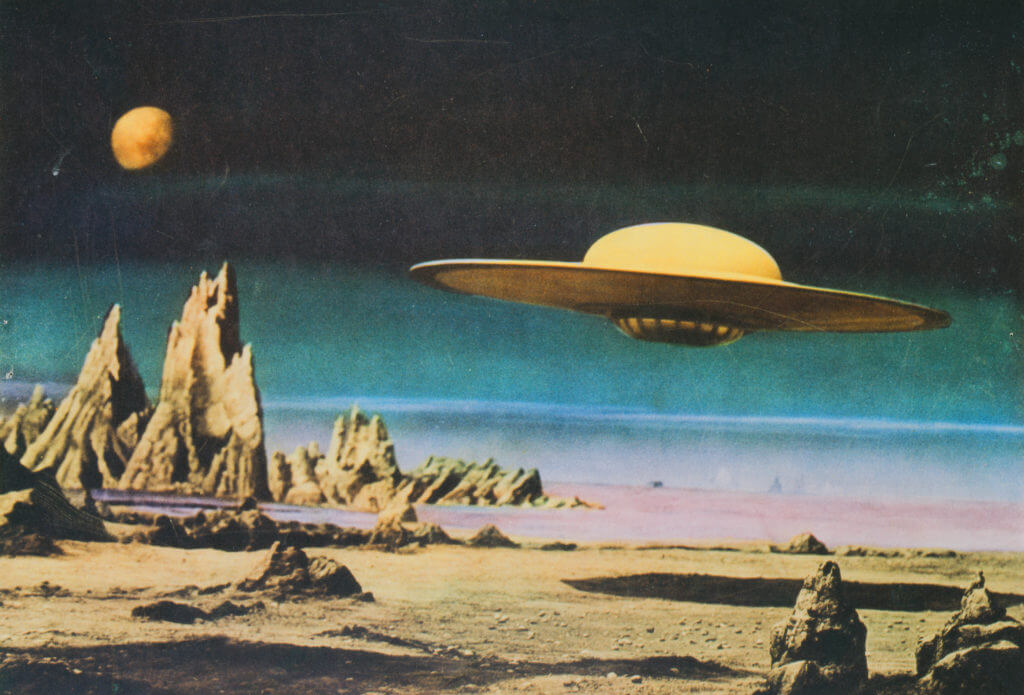UFOs are in the news again.
Though they never recede entirely from the headlines—you can always find stories somewhere speculating about spacecraft or sensationalizing optical illusions that look like saucers in the sky—public interest seems to come in waves, cresting every twenty years or so.
This time around, the burst of public interest can be traced to some 120 sightings and videos made by Navy aviators and Air Force pilots over the last two decades. The claims and the footage have been investigated by small programs in the Pentagon; videos collected from various military sources were leaked the press in 2017; by last year congressional curiosity was sufficient to demand the Pentagon produce a report, the classified version of which apparently says that there is no good explanation for these phenomena. An unclassified version of the report is expected to come out later this month.
The whole story has slipped into the realm of infotainment. In April, NBC produced a story on these sightings; then 60 Minutes did its own segment in mid-May, which in turn led to former President Barack Obama being asked about UFOs on The Late Late Show with James Corden. “There’s footage and records of objects in the skies that we don’t know exactly what they are,” Obama said. Cue the media firestorm among broadcast and cable TV, radio, newspapers, and podcasts. “Yes! You guys!” an excited Fox News personality remarked, “Former President Obama is all but confirming the existence of UFOs!” Her co-panelist Juan Williams joked that the arrival of aliens would only be further evidence that a border wall was required—adding that “Americans love this story. This is a story that could bring us together.”
There’s no way of knowing how long this particular wave of interest will last—or whether it will rival the last time UFO ism was a major part of the American zeitgeist, back in the 1990s.
The ’90s saw a huge wave of pop-culture interest in UFOs and visits from extraterrestrials. One of the leading factors in this alien craze—both a symptom and a cause—was The X-Files, a TV sensation unlike anything before it. At its peak, the show had 20 million viewers tuning in each week to see FBI Special Agents Fox Mulder (David Duchovny) and Dana Scully (Gillian Anderson) deal with unexplained phenomena, possible alien abductions, and shadowy government conspiracies. Meanwhile, aliens-come-to-earth movies were a major draw, featuring such titles as Species (1995), Independence Day (1996), Contact (1997), Men in Black (1997), and The Faculty (1998). Belief in alien involvement in human affairs reached strange new heights, although one of the most infamous statistics of that era—the widely discussed claim, extrapolated from a 1991 Roper survey, that as many as 3.7 million Americans might have been abducted by aliens—tells us less about what the public actually believed than about the strangeness of that intellectual and journalistic moment.
Two of the men behind that statistic can be partly held responsible for the 1990s pop-culture obsession with UFOs. One of them had never evinced prior interest in UFOs and aliens; the other had been thinking about UFOs since the previous wave of public fascination a generation earlier.
John E. Mack, the subject of a new biography by New York Times reporter Ralph Blumenthal, was arguably the most prominent American academic to take a serious scholarly interest in UFOs. Born in New York City in 1929, and raised in what Blumenthal calls “a sheltered, wealthy, secular, German-Jewish home,” Mack graduated from Harvard Medical School in 1955. After completing his residency, he served for two years as a U.S. Air Force psychiatrist in Japan. Mack eventually returned to Harvard as a professor of psychiatry, and became the head of the university’s psychiatry department in 1977—the same year he was awarded a Pulitzer Prize for his psychobiography of Lawrence of Arabia.
Despite his secular upbringing and scientific training, Mack became interested in exploring different states of the consciousness, researching the spiritual breakthroughs of great religious leaders, practicing Holotropic Breathwork, and experimenting with mind-altering drugs.

In 1989, Mack was introduced to Budd Hopkins, a popular New York artist who claimed to have seen a UFO—an experience that Hopkins had described in a 1981 book, Missing Time: A Documented Study of UFO Abductions. While driving to a party in August 1964, Hopkins—along with his wife and a friend—spent a long time watching a mysterious “elliptical object” that appeared to hover before it finally flew away. Several of the partygoers attested to having on other occasions seen UFOs as well. Hopkins began collecting stories about encounters with UFOs.
Mack reacted to Hopkins with curiosity but suspicion. What particularly interested Mack was the hundreds of letters Hopkins had received from other people who claimed to have seen UFOs. In addition to the sheer number of claimants, what also intrigued Mack was the relatively mundane lives they lived. The majority of “experiencers” had normal careers. Most were happily married with children, had plenty of friends, and were well liked in their communities. Few had experienced childhood trauma or had been abused. Most had achieved a high school or higher education. Initially concerned that they might be trying to find notoriety, Mack was taken aback by how frightened these people were. Some worried about their mental health, alarmed that they might be going crazy, while others expressed anxiety about how talking about their experiences could damage their relationships and reputations.
Finding subject patterns and developing a unifying explanatory theory seemed impossible. But the more Mack investigated and the more experiencers he met, the more he became convinced that something genuine had happened to these people—and he spent years trying to figure out what. According to Blumenthal, “he was professionally and personally drawn to the mystery and the plight of the abductees”—but he also had “a yearning for spirituality.” The mystery of alien abductions apparently helped satisfy that yearning, and Mack’s status as a Harvard professor, a respected psychiatric researcher, and a Pulitzer-winning writer brought new vigor to the study of claimed alien encounters.
Prior to Mack, the few psychiatrists and academics who had attempted to tackle the meaning of alien abductions had typically interpreted them as physiological or psychological reactions to trauma. Some theorized that they were hallucinations or false-memory coping mechanisms. Because so many experiencers claimed their abductions had happened at night or while they were asleep, another common explanation involved sleep apnea or night terrors.
Other psychologists suggested that UFO abduction stories are most likely rooted in sexual gratification. Because the subjects often reported that they were abducted against their will and physically violated, it was argued that masochistic escapism was a likely partial explanation for accounts of alien abduction.
Still other psychiatrists chalked up many cases to medical malpractice, with subjects attesting to having seen a UFO or having been abducted by aliens because the power of suggestion and the influence of pop culture—a criticism made all the more potent due to the frequent use of hypnotism on people making such claims. Psychiatrists were increasingly weary of such methods, since this was unfolding at the same time that the repressed-memory psychotherapy that drove so much of the Satanic panic was collapsing.
One academic particularly embroiled in controversy for his use of hypnosis is David M. Jacobs, a longtime professor of history at Temple University. After writing his 1973 doctoral dissertation and his first book on the history of UFOs in America, Jacobs began offering students a course focusing on “UFOs in American Society.” Jacobs was confounded by the number—and the sincerity—of the people who claimed they had been abducted. Despite his background as a historian, Jacobs began hypnotizing subjects who came to him, attempting to “recover” memories of their meetings with aliens.
Jacobs’s subjects typically viewed aliens as hostile and menacing figures. As Jacobs described in Secret Life (1992), the supposed abductees he worked with resembled the victims and survivors of assault or rape. Jacobs asserted that not only were aliens real, but they were kidnapping humans and impregnating them in hopes of producing hybrid babies.
Mack conducted many hypnosis sessions as well, but with very different results. In contrast to Jacobs’s starkly negative views of alien abductions, Mack said that he typically encountered people who had experienced friendly aliens, and who spoke of their abductions in a positive and transformative light—as though it were a profound spiritual experience that brought them a deeper appreciation of their loved ones and the environment as a whole. Mack’s book Abduction: Human Encounters with Aliens, which focused on eight male and five female abductees, was published in 1994 and quickly became a bestseller.

Unlike Jacobs, Mack tried to pose—at least in public and with varying degrees of success—as neutral on the question of whether aliens were real. As a scholar, he suggested, his job was to try to understand a compelling phenomenon; as a clinician, his job was to help and sympathize. When asked “Do you believe these people?” during a 1999 Today show interview, Mack replied, “I think that they’re describing truly and honestly, with appropriate feeling, with intensity, something that happened to them.”
But according to Alexa Clay, who as a child had been a family friend of Mack before his death in 2004, in private Mack was “bolder in his claims,” asserting that aliens were indeed real and that “their existence threatened the dominant logic of our worldview.” But even aliens did not quite solve things for Mack, who privately started to ponder if the individuals he studied had actually been engaging with beings on a higher consciousness or on another dimension. As Blumenthal describes in his biography of Mack, the psychiatrist became increasingly uninterested in trying to find the kind of “proof” of the existence of aliens that so preoccupied Jacobs and Hopkins. Indeed, Blumenthal writes, Mack’s final book, Passport to the Cosmos (1999), shows he came to regard “the alien-abduction phenomenon as only one of the mysterious crossovers confronting human consciousness, along with near-death and out-of-body experiences, animal mutilations, crop circles, apparitions of the Virgin Mary, and shamanic soul flights.”
Understandably, Mack’s work divided his colleagues, both at Harvard and in the psychiatric community more generally. Some believed he was well-meaning, genuinely inquisitive, but disastrously gullible. Others accused him of being recklessly unscientific in his studies and unscholarly in his conduct. Like Jacobs, Mack came under intense criticism for his use of hypnosis, with many comparing the memories produced by his subjects to those produced during the Satanic abuse panic. In the mid-1990s, Harvard launched an investigation into Mack’s methods, and though the university considered censuring him, it ultimately reaffirmed Mack’s tenured privilege of academic freedom.
The intense popular interest in aliens and UFOs during the 1990s dissipated around the turn of the century. By 2001, the weekly audience for The X-Files was half what it had been at the show’s peak. Then came the terrorist attacks of September 11, 2001, which not only focused the nation’s attention on matters of national security and war, but also resulted in a rapid rise in Americans’ trust in their government. In that new atmosphere, the kinds of stories told on The X-Files—tales of government conspiracies and coverups about aliens—came, at least for a while, to seem frivolous.
Meanwhile, advances in consumer technology chipped away at the public belief in UFOs. As ever more people had phones with cameras on them at all times, blurry photos and amateur videos, once a staple in UFO sightings, seemed to disappear. The burgeoning market for drones meant that there was suddenly a plausible explanation always at hand for many strange sights in the sky. Over the 2000s, numerous alien interest groups were disbanded, and the frequency of UFO sightings was in free fall. And instead of movies about extraterrestrial encounters, audiences were being offered a different genre of blockbuster: superheroes.
While John Mack’s untimely death—he was struck and killed by a drunk driver in 2004—did not entirely end the academic study of supposed alien abductions and related paranormal claims, it did greatly diminish it. Mack’s own Harvard-based Program for Extraordinary Experience Research evolved into the freestanding John E. Mack Institute, which seems today to exist only to promote Mack’s memory and preserve his papers. David Jacobs, now retired, has continued to write about UFOs and extraterrestrials, but to far less fanfare than before. A quick search turns up a handful of doctoral dissertations, monographs, and journal articles from the last decade that touch on alien abductions—suggesting that, at least for some scholars, the academic study of alien abductions remains a compelling, though controversial, area of research.
And the aliens-on-earth theme hasn’t entirely disappeared from our popular culture. Ancient Aliens has remained a staple of the History Channel, with one of its frequent “experts” achieving meme status. A few hundred people participated in the 2019 storming of Area 51, a stunt that grew out of a joke suggested on Joe Rogan’s podcast. President Trump repeatedly discussed his interest in UFOs. And now, with the Pentagon report—not to mention President Obama’s comments—it is possible that interest in UFOs and aliens will surge once again.
We are the change the world has been waiting for!
Have you witnessed an unidentified flying object?
Whether you think UFOs are black projects, extraterrestrial craft, something else altogether, or just don’t know.
Unconditional love. The road we all get to walk. Unconditional love is like the sun.
WE ARE THE DISCLOSURE ~ WE HAVE NEVER BEEN ALONE
Love and Regards,
Thank You,
Nancy Thames
Source: Daniel N. Gullotta




